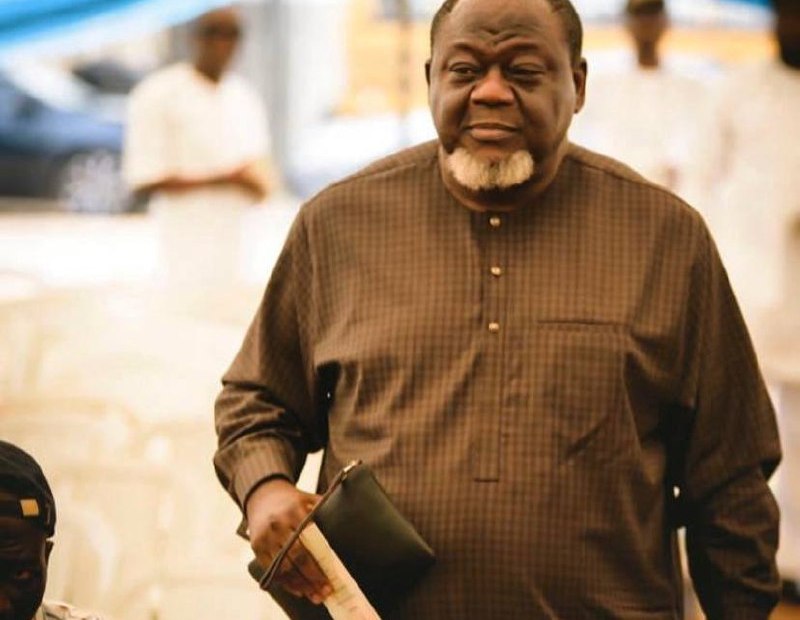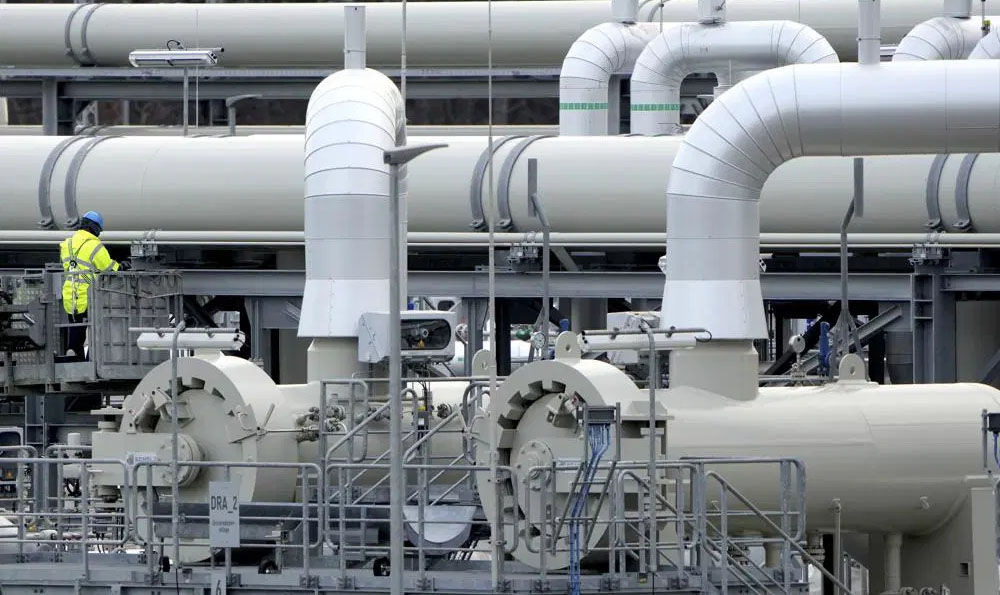Business
Nigerian airlines can’t survive current economic crisis – Fairfax Africa boss alerts

Nigerian airlines can’t survive current economic crisis – Fairfax Africa boss alerts
The Fairfax Africa Fund, backers of the ill-fated national carrier, Nigeria Air, has issued a stark forecast, predicting the collapse of all domestic airlines currently operating in Nigeria amidst the country’s worsening economic crisis. According to Zemedeneh Negatu, Global Chairman of Fairfax Africa Fund, only one airline among Nigeria’s domestic carriers has a chance of weathering the economic storm.
Negatu’s foreboding projection follows a statement by Prof. Obiora Okonkwo, Chairman of United Nigeria Airlines, in which he described Nigeria’s aviation sector as being on “life support.”
Addressing Okonkwo’s concerns, Negatu expressed that the current state of domestic airlines is dire, insisting that no amount of government bailouts—no matter how generous—could save the majority of them from inevitable collapse.
“None of Nigeria’s airlines operating today, except one, will survive even if they were to be given tens of millions of dollars in government (taxpayer) bailouts in perpetuity,” Negatu asserted, without elaborating on the specific reasons behind this grim outlook.
However, the Fairfax chairman did not stop at predictions.
He leveled serious accusations against two leading Nigerian airlines—Air Peace and United Nigeria Airlines—alleging that they had orchestrated the failure of Nigeria Air through legal actions spearheaded by the Airline Operators of Nigeria (AON). Negatu claimed that Nigeria Air would have been a lifeline for the industry, potentially stabilising it and attracting significant foreign investment, but that these efforts were thwarted by what he described as self-serving interests masked as patriotism.
READ ALSO:
- Shiites have declared war, says FCT police commissioner
- Human rights abuses using DSS, police rising under Tinubu – Atiku
- NAF airstrikes kill terrorists in Kaduna, Zamfara, destroy 25 illegal refineries
“Promoting self-interest under the guise of ‘patriotism’ is not a viable long-term business strategy,” Negatu declared. “The efforts by United Nigeria and Air Peace to block a substantial Foreign Direct Investment (FDI) into Nigeria, including significant American investment, will deter others from considering the much-needed FDI in the sector.”
Negatu’s comments come in the wake of a landmark judgment on August 5, 2024, by Justice Lewis Allagoa of the Federal High Court in Lagos. The court ruled the sale of shares in Nigeria Air to Ethiopian Airlines as illegal, citing multiple violations of existing laws, including the Companies and Allied Matters Act and Securities and Exchange Commission regulations. The court invalidated the entire bidding process, revoked Nigeria Air’s Air Transport License, and permanently barred the former Minister of Aviation, Hadi Sirika, and Ethiopian Airlines from further involvement in the project.
Reacting to Negatu’s dire forecast and allegations, Prof. Obiora Okonkwo, spokesperson for the Airline Operators of Nigeria (AON), dismissed the claims as misguided. He pointed out that the harsh economic conditions affecting the aviation sector are a reality everyone is grappling with and not a result of Fairfax’s predictions.
“It doesn’t take a soothsayer to know that the economic environment in Nigeria is harsh and doesn’t only affect the aviation sector,” Okonkwo told Daily Sun.
He added: “If anything happens to airline operators in Nigeria, it won’t be because of Negatu’s prediction but due to the broader economic environment. The survival of Nigeria’s aviation sector so far is because the ‘evil’ intentions of Ethiopian Airlines and their collaborators under the guise of Nigeria Air failed. If it had succeeded, it would have sent the aviation industry to an early grave.”
On the accusation that Air Peace and United Nigeria spearheaded the downfall of Nigeria Air, Okonkwo was emphatic in his defense. He acknowledged that both he and Allen Onyema, Chairman of Air Peace, are indeed members of the AON, the body that took the federal government and Ethiopian Airlines to court, effectively safeguarding the aviation sector from what he described as a catastrophic plan.
READ ALSO:
- Napoli agree deal with Man Utd for McTominay
- Court freezes 32 bank accounts linked to #EndBadGovernance protest, orders holders arrest (+FULL LIST)
- Sudan won’t join peace talks, says army leader
“Ethiopian Airlines had the opportunity in court to present evidence of their investment, and if they had done so, the outcome—which permanently banned them from owning shares—would have been different,” Okonkwo argued.
He continued: “We can understand Negatu’s pain because from being a transaction advisor, he was to get three percent shares from Nigeria Air for doing nothing and also be the only person to do all the procurement. He is a cry baby and if he says that Air Peace and United Nigeria are the ring leaders, then we are very proud to be part of the AON which saved Nigeria from their dubious transactions. We consider ourselves heroes because they couldn’t contradict any accusations that the AON made against them in court which are that the transaction is dubious and they just wanted monopoly which would have drained our economy.
“The then administration signed that the government will indemnify ET from every debt they would have accrued. In the agreement, ET wasn’t supposed to invest money to buy aircraft on behalf of the partnership. The airline would continue to lease to the partnership on wet lease, so the money they would have been indemnified against would have been in billions of dollars to buy aircraft for ET, which they would in turn, lease to Nigeria. ET and their Nigerian dubious collaborators would have been the only ones profiting. There would have been nothing for Nigerians to gain,” Okonkwo said.
In a rapidly-changing landscape, the battle for the soul of Nigeria’s aviation industry remains fierce, with accusations and counter-accusations flying between stakeholders. As the dust settles on the Nigeria Air debacle, the future of the country’s aviation sector hangs in the balance, clouded by economic uncertainty and the specter of past controversies.
Nigerian airlines can’t survive current economic crisis – Fairfax Africa boss alerts
Auto
FG deploys Lanre Shittu CNG buses as airport shuttle

FG deploys Lanre Shittu CNG buses as airport shuttle
The Federal Government has commenced the deployment of Lanre Shittu Motors (LSM)-branded Compressed Natural Gas (CNG) buses in the nation’s airports for passengers shuttle.
The first batch of the CNG-powered buses has been launched at the Murtala Muhammed Airport, Lagos, at a ceremony attended by the Minister of Aviation and Aerospace Management, Festus Keyamo, and Managing Director, Federal Airports Authority of Nigeria (FAAN), Mrs Olubunmi Oluwaseun Kuku.
Speaking during the unveiling at the Lagos airport, the minister said the deployment was in line with the directive of President Bola Tinubu.
He said it was part of Nigeria’s commitment to reducing carbon emissions and meeting global climate targets.
‘’What you see here today is a fleet of CNG buses for FAAN to commence passenger movement at all our airports immediately,” the minister said.
He said the newly acquired CNG-powered LSM buses unveiled at the Lagos airport are eco-friendly with zero emission and designed with accessibility features for persons with disabilities.
The deployment, he added, was in compliance with the President’s goal of reducing reliance on traditional fossil fuels of petrol and diesel and promoting sustainable use of CNG to power vehicles in the country.
The introduction of the CNG to power automobiles is one of the Federal Government’s initiatives to ease the impact of fuel subsidy removal on the masses.
The CNG buses, according to the Managing Director of Lanre Shittu Motors, Taiwo Shittu, come in two specifications: a 31-seater for airport shuttle services and a 54-seater for mass transit city buses.
He said they had been equipped with modern amenities, including air conditioning, viewing screens, and charging stations.
With the introduction of the CNG buses, he said LSM aimed to provide a more sustainable and efficient transportation solution not only to Lagos but other parts of the country.
Auto
LSM MD extols founder’s qualities after latter posthumous industry award

LSM MD extols founder’s qualities after latter posthumous industry award
*He left us a good name, says son
Founder and late Chairman of Lanre Shittu Motors (LSM), Alhaji Olanrewaju Shittu, has been honoured with a Nigerian auto industry posthumous award.
This was announced in Lagos at the 2024 edition of the annual
Nigeria Auto Journalists Association (NAJA) announced this in Lagos at the 2024 recently industry awards.
The prestigious award was received by one of his sons, Mr Taiwo Shittu, who is also the managing director of the auto company.
NAJA said the award was in acknowledgement of the leading role of the LSM founder in the development of the automotive business in Nigeria, describing him as a silent achiever.
Speaking on the honour, Taiwo Shittu, who was also declared the Nigeria’s Auto Personality of the Year, praised his father for painstakingly building the LSM brand and leaving behind a good name to the delight of the children and the entire family members.
He described this as a legacy accounting for the success of the company so far since his father’s demise over a year ago.
He said, “I must thank my late father, Alhaji Razaq Olanrewaju Shittu, for building the brand name. There is nothing like a good name.
“If you don’t leave anything for your children other than a good name, the sky is the limit for them.
“In our own case, he left us money and the good name. We can’t thank him enough for leaving us with a good name.
“You can imagine that everywhere we turn to in the country, once we mention we are Lanre Shittu’s sons, we are ushered in immediately.
“People would say ‘Your father was a good man. He won’t cheat you if you did any business with him. His word was his bond; he never broke his promises’. I have heard this many times. And the only thing we can do is to build on this legacy.”
Taiwo Shittu also noted that the unity existing among the 20 surviving children of the late LSM founder was part of his father’s legacies and something for other family businesses in Nigeria to emulate.
He said, “A lot of businesses collapse after the death of their owners. Once a business founder is dead, the next you hear is that a fight has broken out and while one person is taking the arm, another is claiming the leg, the other is going for the body. And in six months, the whole empire is gone down.
“In our case, we have 20 siblings that are cooperative and believe in my ability to lead the business with my other brothers.
“We had a father who never spoiled us. He taught us sincerity, commitment and accountability.”
He also spoke about the lifestyle of the late father, saying even though he was a car dealer and loved cars, he would only change his main car after every 10 years.
“Yes, he loved cars. He used to have a Rolls Royce. But he no longer had it before he died. What he had was a Mercedes-Benz Maybach. His car garage was not packed full. Even though he was a car dealer, he changed his main car every 10 years.
“He was a very prudent man. At the beginning of his adult life, he had many cars; in the middle, he was prudent. It was at the end that he bought some flashy cars such as Lexus L600, MayBach 650 engine – at that time only he and ex-President Muhammadu Buhari had that car. He bought the car then because the family was preparing for three weddings. By time he died, the MayBach had only run 600 miles.”
The LSM chairman, according to him, started the auto business in the late 1970s as a car dealer with three vehicles.
He said he was so creditworthy that many were willing to release their vehicles to him on credit, adding that this helped the business to grow faster.
He recalled how he would travel to Ogbomosho, Oyo State, and Kaduna to buy cars and returned to Lagos with double the number he could readily paid for.
“Sometimes, he would travel as far as Kaduna to buy 12 cars from PAN, he would be the person driving the last vehicle while others were ahead driving all the way to Lagos,” he stated.
Before delving into automobile assembling, he also recalled that Daewoo and Rolls Royce were the two brands that gave the LSM a real breakthrough.

Business
Nigeria remains oil/gas investment destination with $5bn shell FID – TDF

Nigeria remains oil/gas investment destination with $5bn shell FID – TDF
The Democratic Front (TDF) has announced that Shell’s $5 billion Final Investment Decision (FID) for the Bonga North Deep Offshore field further highlights the investment-friendly approach of the Tinubu administration.
This was disclosed in a statement signed by the Chairman, Mallam Danjuma Muhammad, and Secretary, Chief Wale Adedayo.
The group explained that the investment demonstrates how International Oil Companies (IOCs) still see Nigeria as an attractive destination for investments.
“We join President Bola Tinubu in celebrating the Final Investment Decision (FID) by Shell on Bonga North Offshore Field.”
“It is a thing of pride for us that the investment is the outcome of reforms introduced by the President through the Presidential Directives numbers 40, 41, and 42 to fast-track regulatory approvals, reduce operational costs, and promote competitive fiscal incentives in the oil and gas sector.”
READ ALSO:
- Baby freezes to death overnight in Gaza as ceasefire delays
- I was not removed by Tinubu – Ex-Women Affairs minister [VIDEO]
- Ghanaian president approves visa-free entry for all Africans
“We have a conviction that the pertinence of the fresh investment in the sector and indeed the larger Nigeria economy is not only limited to the $5 billion value of the investment but also extends to the field’s potential volume of 350 million barrels of crude oil. It is a development that is bound to further raise the nation’s oil output and revenue as well as bolster its position as Africa’s largest oil producer.”
The group noted that this and other strategic investments, such as TotalEnergies’ $500 million in the Ubeta gas field, are driven by President Tinubu’s fiscal incentives, showcasing the success of his reforms in attracting foreign direct investment to Nigeria’s oil and gas sector.
“The Ubeta upstream field is estimated to produce 350 million standard cubic feet of gas per day when operational and will go a long way to raise the country’s profile as a major gas producer. This remarkable economic feat was unarguably achieved under the economic reform of President Bola Tinubu.”
“It is instructive that since its discovery in 1996, the Bonga deepwater field, located in OML 118, at a water depth exceeding 1000 meters, has not witnessed such a humongous investment as the $5 billion coming from Shell and this is an attestation of President Tinubu’s pro-business approach to governance.”
“Furthermore, this extraordinary display of confidence in Nigeria’s investment ecosystem is a confirmation of the success of the current reforms in eliminating investment encumbrances and the risks of doing business in Nigeria.”
TDF is confident that more IOCs will key into the fiscal incentives introduced by the Tinubu administration to make fresh investments in Nigeria’s oil and gas sector.
Nigeria remains oil/gas investment destination with $5bn shell FID – TDF
-

 Business2 days ago
Business2 days agoBe creative, monarch, others challenge Muslim professionals on economic revival
-

 Auto1 day ago
Auto1 day agoLSM MD extols founder’s qualities after latter posthumous industry award
-

 Entertainment2 days ago
Entertainment2 days agoMultiChoice announces free access to all DSTV channels for 3 days
-

 metro2 days ago
metro2 days agoJigawa State governor loses son 24 hours after mother’s death
-

 News1 day ago
News1 day agoNigeria Customs Service begins 2025 recruitment [How to apply]
-

 metro1 day ago
metro1 day agoHeavy security in Ilesa as ex-Osun deputy gov emerges new Owa-Obokun
-

 metro1 day ago
metro1 day agoLagos Imam to Tinubu: You haven’t disappointed us
-

 metro1 day ago
metro1 day agoDangote, Tinubu, Lookman named among 100 most influential Africans in 2024 (Full list)



